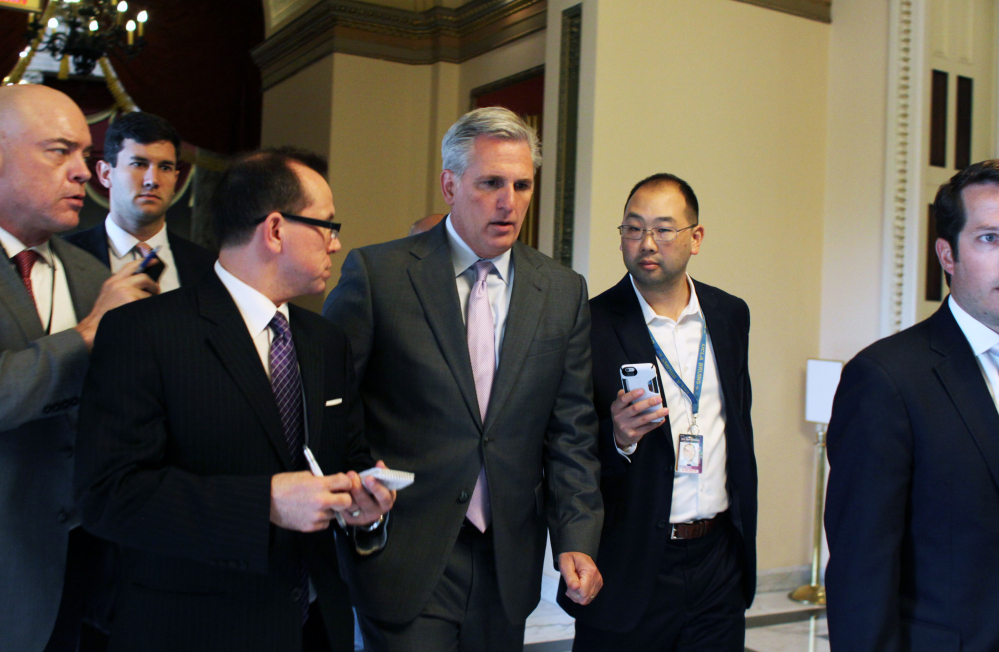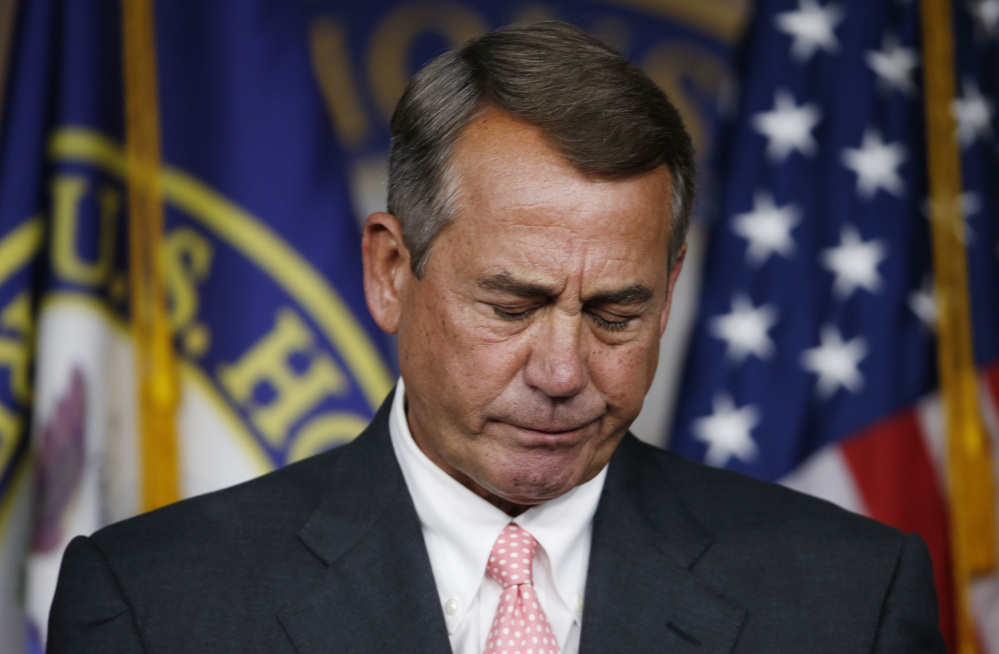WASHINGTON — When Republicans scored their big victory in the midterm elections of 2010, they looked like a party on the rise after a devastating pair of losses in 2006 and 2008. Instead, they have become a party in almost permanent disorder, torn by warring factions and near-constant tensions between their establishment leadership and a tea party-infused grass roots.
Now, in the wake of Friday’s stunning announcement by House Speaker John A. Boehner that he will step down from his post and resign his seat in Congress at the end of October, the question again arises: Can a party so riven by anger, a party divided over confrontation versus compromise, actually govern in Washington?
Boehner’s decision to quit, and the suddenness with which the news broke, provided one more piece of evidence of how badly strained the Republican coalition is. Boehner’s inability to corral his unruly members was legendary and, seemingly, never-ending, a series of “Perils of Pauline” moments that brought temporary truces but never fully resolved the debate about the kind of party Republicans want.
Those divisions have infected the battle for the Republican presidential nomination. Anger at Washington among grass-roots Republicans has turned the party’s nomination contest upside down. In the early autumn of 2015, non-politicians like Donald Trump, Ben Carson and Carly Fiorina are prospering at the expense of those who are governing or have governed at the state level.
Much of this has its roots in the reaction to the election of President Obama and to the agenda he has pursued in office. The president’s economic and health-care initiatives in 2009 gave rise to the tea party, and the tea party provided much of the energy that swept Democrats out of power in the House in 2010. The party in Washington – the party overall – has not been the same since.
The anger has fed on itself. Grass-roots Republicans are frustrated that their leaders in Washington have not been more successful in checking Obama or rolling back what he has been able to do. That led to repeated and futile efforts to repeal the Affordable Care Act. It prevented House action on immigration. Two years ago it boiled over and forced the partial government shutdown.
That shutdown damaged the brand of the Republican Party, but it seemingly did nothing to stop Republicans in the midterm elections of 2014, when the party scored another series of victories by taking control of the Senate and holding key governorships. But even with additional power in Washington, the status quo remained largely unchanged, with grass-roots conservatives irritated with their leaders for not doing more to advance their anti-government agenda.
Trump’s rise these past few months was unexpected, and it has not gone unnoticed among Republican rank-and-file in Washington. They can sense the anger he has tapped into and want to associate themselves with it – not with establishment leaders who were already in disfavor at the grass roots. That further undermined Boehner’s already fragile standing and no doubt contributed to what happened Friday.
Tea party loyalists and leaders cheered Boehner’s decision to step down, claiming it as a victory for their movement. To them, Boehner was a symbol of all that was wrong with the Washington GOP establishment. They saw him as a leader who, instead of finding ways to advance their conservative agenda, capitulated to Obama or to moderates in their party.
Boehner stepped aside for the good of his party and presumably out of fatigue at the constant struggle with the rebellious faction in the House. But his departure will hardly resolve the contradictions and divisions that marked his tenure. A leadership contest will ensue, giving the opportunity for a fresh start in the House. But the new speaker and team will grapple with the same underlying problems – the same irreconcilable issues – that bedeviled Boehner.
Beyond that, no congressional leader can truly lead his or her party nationally. That is reserved for presidential nominees and ultimately presidents. It’s often been said that the most successful among them are politicians who define their parties rather than being defined by them.
Who among those now seeking the Republican nomination can do that most effectively – and around what message? The candidate currently at the top of the polls – Trump – promises what the rebellious forces in the Republican Party most want to hear: that Washington is broken and only an outsider can fix it. But he offers little in the way of evidence that he can do so.
Texas Sen. Ted Cruz offers a similar outsider message but with purer conservative convictions than the reality TV star.
Can any of the others in the presidential field – former Florida governor Jeb Bush, Ohio Gov. John Kasich and Florida Sen. Marco Rubio, to name just three – tap that anger and unhappiness within the party base and still make a case for conservative governing that includes compromise and cooperation with the Democrats?
Republicans have been on a rightward journey since President George W. Bush left office in 2009, and their leaders have been in hot pursuit. The nomination contest of 2012 pushed Mitt Romney farther to the right on immigration than was politically sound. The current contest threatens to do the same to the eventual nominee.
There will be a new House speaker long before the party settles on a presidential nominee. And the nomination battle, however it looks today, has twists and turns ahead that will surprise and confound many people.
But the reality is that the Republicans in their current state appear both difficult to lead and divided about where they want to go. To win in November 2016, their nominee will have to show he or she leads a party ready and willing to govern.
Balz is chief correspondent at The Washington Post.
Copy the Story LinkSend questions/comments to the editors.




Success. Please wait for the page to reload. If the page does not reload within 5 seconds, please refresh the page.
Enter your email and password to access comments.
Hi, to comment on stories you must . This profile is in addition to your subscription and website login.
Already have a commenting profile? .
Invalid username/password.
Please check your email to confirm and complete your registration.
Only subscribers are eligible to post comments. Please subscribe or login first for digital access. Here’s why.
Use the form below to reset your password. When you've submitted your account email, we will send an email with a reset code.